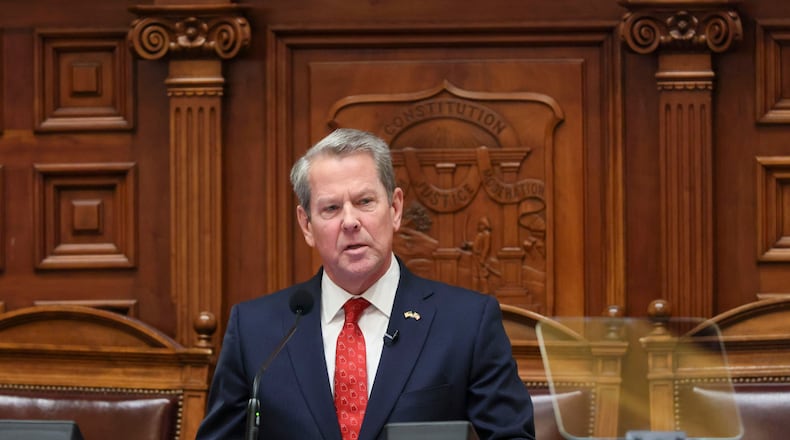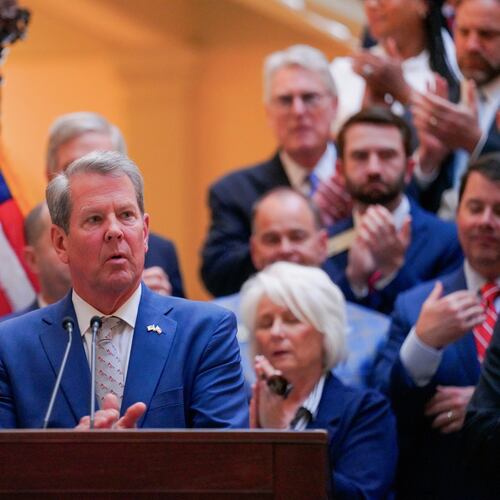Gov. Brian Kemp on Thursday signed a pair of bills projected to save Georgians and businesses about $500 million on income taxes next year.
He made the move — part of an election year push by the General Assembly to cut taxes — at the same time revenue has declined amid record state spending.
“Georgians know best how to spend their money a lot better than the government does,” Kemp said before signing the tax cuts.
One measure, touted by Kemp before the session — House Bill 1015 — will speed up plans first passed in 2022 to gradually reduce the state income tax rate on individuals from 5.75% to 4.99%. The rate dropped to 5.49% in January, and HB 1015 cuts it to 5.39%.
That may not sound like a lot, but state officials project the change will save taxpayers — and cost the state — about $360 million next year. The size of the savings depends on someone’s income. If, for example, you have $60,000 in taxable income after deductions, your savings will be about $60.
The measure was one of House Speaker Jon Burns’ top priorities this session. His counterpart in the Senate, Lt. Gov. Burt Jones, wants to eliminate the state income tax.
Individual income taxes are the state’s top source of revenue to fund schools, public health, policing, courts and dozens of other functions.
A second measure — House Bill 1023 — ties the corporate income tax rate to the individual rate, dropping it from 5.75% to 5.39%. That will save businesses $127 million to $175 million next year, according to state estimates.
The corporate income tax rate was the same as the individual income tax rate for decades. That changed in 2022 when lawmakers passed the bill cutting rates on individuals.
Kyle Wingfield, president of the conservative Georgia Public Policy Foundation, told lawmakers during the session that eliminating corporate income taxes could help spur economic growth.
“You get a greater bang for your buck cutting corporate income taxes than you do personal income taxes,” he said. “I realize when it comes to the political scenario, you might not get quite the bang for your buck, but when it comes to the economic scenario, that is a more efficient way to cut taxes.”
Kemp also signed House Bill 1021 to increase the standard income tax exemption on dependents from $3,000 to $4,000.
In addition, Kemp inked House Bill 581, which will cap how much home assessments can go up each year at the rate of inflation in an effort to tamp down property tax increases.
The measure will allow all local governments to use revenue from a 1-cent sales tax hike to lower property taxes. Some local governments already have similar taxes.
Cutting taxes is one of lawmakers’ favorite pastimes in an election year when the entire General Assembly goes before voters. The 2022 bill to begin gradually lowering the income tax rate was passed during a heated reelection campaign for Kemp and other state officials.
Legislative leaders are cognizant that they are cutting taxes — and revenue — at a time when the growth in tax collections has stalled. Revenue in March was off 12.6%, and Kemp’s budget proposals for the coming year predict a continued slowing.
However, Kemp and lawmakers are spending like it’s a boom time because the state ran record surpluses for three consecutive fiscal years after the COVID-19 shutdown. The state started the 2024 session with $16 billion in “rainy day” and undesignated reserves.
In February, Kemp signed a record midyear budget that runs through June 30 and includes $5 billion in new spending, including money for massive renovations on Capitol Hill, a new medical school at the University of Georgia, a new state prison, and miles and miles of roads.
Last month, lawmakers passed a slightly less ambitious fiscal 2025 budget that still includes 4% raises for many state workers and more money for law enforcement, education and mental health programs.
About the Author
Keep Reading
The Latest
Featured



